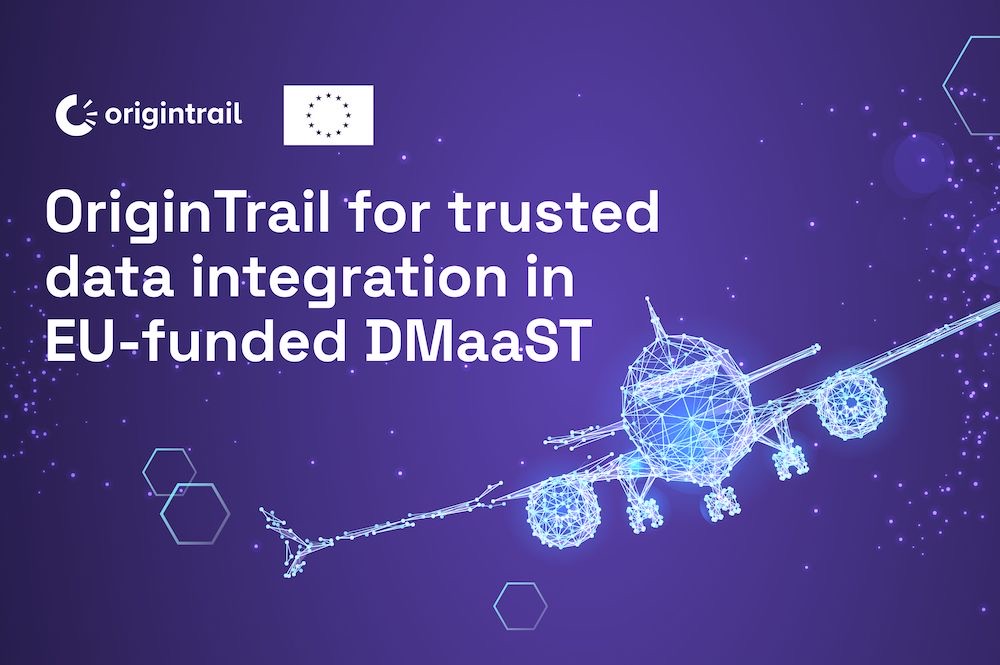Trace Labs, the core developers of OriginTrail, has joined the European Union’s initiative to foster a resilient and adaptive manufacturing ecosystem through the DMaaST project. Collaborating with partners from Slovenia, Spain, Germany, Portugal, Turkey, Serbia, Belgium, Lithuania, France, Denmark, and Switzerland, the initiative will leverage the OriginTrail Decentralized Knowledge Graph (DKG) and Knowledge Assets (KA) to encapsulate all pertinent information regarding products, processes, facilities, and human expertise. This comprehensive approach will facilitate the precise mapping of data flows and knowledge interconnections, laying the groundwork for comprehensive information mapping within the manufacturing ecosystem using OriginTrail DKG. Consequently, this will ensure trustworthy cross-organizational real-time data integration.
Once more, attention has been drawn to challenges within the aeronautic and manufacturing industries following a January incident in which a Boeing 737 MAX 9 door plug blew out in the middle of an Alaska Airlines flight. If the company had established reliable cross-organizational communication, it could have prevented this incident. Such communication would enhance the value chain’s responsiveness to external and unforeseen events, as well as improve operability and production planning capacity.
Effective, transparent, and reliable data exchange are the most important points for fostering sustainability, resilience, and energy efficiency in the manufacturing industry. However, over the past years, various challenges have come to the forefront within this sector.
- Supply Chain Disruptions: The COVID-19 pandemic highlighted existing vulnerabilities in global supply chains, leading to disruptions in the flow of materials and components. Issues such as raw material shortages, transportation bottlenecks, and labor shortages have persisted, impacting manufacturing operations worldwide.
- Cybersecurity Risks: With the increasing digitization of manufacturing processes through technologies like the Internet of Things (IoT) and Industry 4.0, cybersecurity threats have become a significant concern. Manufacturing facilities are increasingly vulnerable to cyberattacks that can disrupt operations, steal sensitive data, or compromise product quality and safety.
- Data Silos: Manufacturing organizations often operate with fragmented data systems, leading to isolated data silos across departments or functions. This fragmentation inhibits seamless data interoperability and hampers comprehensive insights that could drive operational efficiency and innovation.
- Lack of Standards: The absence of standardized data formats and protocols complicates data exchange and integration efforts within and across manufacturing enterprises. Without universally accepted standards, interoperability becomes a significant challenge, impeding the flow of data between different systems and stakeholders.
- Data Privacy Concerns: With the proliferation of data collection and sharing practices in manufacturing, ensuring data privacy and protection is paramount. Manufacturers must navigate complex regulatory landscapes, safeguarding sensitive information from unauthorized access or misuse while balancing the need for data-driven decision-making.
- Ownership and Control: Determining ownership rights and control over manufacturing data can be contentious, especially in collaborative environments or supply chain networks. Disputes may arise regarding data ownership, usage rights, and intellectual property, complicating data sharing agreements and hindering collaborative initiatives.
- Legacy Systems Integration: Many manufacturing facilities still rely on legacy systems that were not designed with interoperability in mind. Integrating these outdated systems with modern data platforms and technologies poses significant challenges, requiring extensive customization, retrofitting, and investments in interoperability solutions.
DMaaST aims to enhance manufacturing ecosystem resilience and adaptability by employing a Smart Manufacturing Platform comprising four layers. The data layer establishes a foundation for real-time data integration across organizations using ontologies and OriginTrail Decentralized Knowledge Graph. Following this, a two-level cognitive digital twin is deployed to model both manufacturing services production lines and value chain stages. It incorporates human expertise, data-driven algorithms, and physical modeling. An algorithm for multi-objective distributed decision support systems leverages this data to facilitate optimal production decisions. Outcomes will be communicated via user-friendly interfaces and timely scoreboards, assessing circularity, sustainability, and product traceability. Over the four-year period, DMaaST ensures scalability and innovation by providing insights for replicating and improving manufacturing processes, advancing technologies in aerospace and electronics sectors.
Trace Labs will lead the data working group to develop and validate technologies aimed at facilitating data understanding, interoperability, and secure cross-organization integration. With integration of OriginTrail DKG for the electronic and aeronautical sector, creating a new powerful knowledge base with artificial intelligence capabilities. The DKG will establish a decentralized database accessible to all participants in a manufacturing value chain, including manufacturers, suppliers, distributors, retailers, regulatory bodies, research institutes, and others. This will enhance the manufacturing ecosystem’s ability to autonomously withstand and adapt to external events.
OriginTrail DKG has been widely utilized to foster trust and transparency in enterprise knowledge exchange across various industries. Now, it is evolving to facilitate global knowledge connectivity, powering the Decentralized Retrieval Augmented Generation (dRAG) framework for more precise and inclusive AI. Given the challenges of verifying AI-generated results, OriginTrail DKG, with Knowledge Assets as its primary resource, represents a pivotal innovation in this context. It offers a robust framework for ensuring the ownership, discoverability, and verifiability of information utilized by AI systems for the manufacturing industry.






